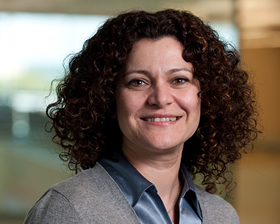What's New?
2018 News
Map describing Canadians' context now available online
Members of our group have collected data from communities across Canada and assembled it into a map available online. The map contains data about connectivity as well as food, tobacco, and alcohol availability and price. This data was collected as part of the Canadian Alliance for Healthy Hearts and Minds, which is studying cardiometabolic risk factors in Canadians. Papers describing the data collected and the map have now been published.
PGP Members Speak at Canadian Ethnicity and Cardiometabolic Disease Conference
Drs Sonia Anand, Russell de Souza, and Guillaume Pare spoke at the first annual Canadian Ethnicity and Cardiometabolic Disease Conference. Dr Anand co-chaired the conference. The slides for Dr Anand and Dr de Souza's presentations are available under Conferences.
2017 News
McMaster University’s Faculty of Health Sciences and Cisco Canada will host ‘Omics and Epidemiology, a two-day conference at the Cisco Toronto Innovation Centre (and virtually, in the Cisco online classroom).
The event, set for May 25 and 26, is an outcome of the McMaster-Cisco partnership, which is committed to increasing research activities in Integrated Health Biosystems and Bioinformatics. Dr. Guillame Paré, who holds a CISCO Professorship in Integrated Health Systems, has organized the conference with members of McMaster University’s Population Genomics Program (PGP).
Speakers will include PGP members and experts from leading institutions including Harvard University, who will share their vision, using the latest Cisco communication tools and forward-thinking educational strategies.
Congratulations Sujane Kandasamy!
The results of CIHR's 2016 IHDCYH Talks Competition are in, and our own Sujane is a runner up with her video The South Asian Birth Cohort Sub-Study: Optimal Perinatal Health Behaviours from the Perspectives of Grandmothers.
2016 News
Fifth annual Chanchlani Global Health Research Award recipient named
Dr John Ioannidis is the recipient of the fifth annual Chanchlani Global Health Research Award. He will present his lecture Improving Research Practices: A Global Challenge on Monday February 6, 2017 at 4:30 pm. For more details, read this article from the McMaster Global Health Office.
December 7, 2016
The 4th Frederick E. Hargreave Lectureship
Monday November 28, 2016
Miller Auditorium
2nd Level Juravinski Innovation Tower
St. Joseph's HealthCare Hamilton
Reception: 5:00pm
2nd Level Lobby
Lecture: 5:30pm
Guest Speaker: Dr Benjamin Raby, MD, MPH
Associate Professor of Medicine, Harvard Medical School
Director of the Pulmonary Genetics Laboratory, Brigham & Women’s Hospital
The Department of Medicine and the Divisions of Respirology and Allergy & Clinical Immunology are pleased to announce the 4th Frederick E. Hargreave Lectureship in Asthma and Allergy to honour the memory of our dear colleague, who passed away on the 15th of June, 2011. Professor Freddy Hargreave was one of the giants of respiratory medicine. His work helped change the way we understand, diagnose and treat asthma, bronchitis and COPD. In doing so, he significantly improved the care of patients throughout the world and his work improved many lives. At the Firestone Clinic, over a 4o year career, he taught many students and fellows from all over the world, many of whom returned home and became internationally recognized in their own right. He made St Joseph’s Hospital and the Firestone Clinic world famous, but more importantly, he cared for individual patients in an exemplary manner with unfailing courtesy, dedication, humility, and kindness. He constantly endeavored to bring the health challenges his patients faced every day to the research community in order to find better ways to improve the quality of their lives.
The 2016 Lecture will be delivered by Dr Benjamin Raby. After obtaining his medical degree and fellowship in internal and pulmonary medicine at McGill University and a fellowship at the Montreal Genome centre, he moved to Harvard Medical School for further training in genetic epidemiology, quantitative methods and functional genomics where he currently directs an innovative translational research program at the Channing Division of Network Medicine. He is the founder and director of the Brigham and Women’s Hospital Pulmonary Genetics Center, the only centre of its kind, where he cares for patients with inherited lung diseases. His primary research focuses on combining genomic and computational approaches for the mapping of the genetic determinants of asthma in human populations. His work has been continuously funded by multimillion dollar grants from the NIH for the past 13 years, and includes the development of Asthma BRIDGE – the Asthma BioRepository for Integrative Genomics Exploration – a multinational effort that established a publicly accessible repository of cell lines and detailed omics datasets from 1,500 asthmatic and healthy subjects to facilitate integrative, systems-based approaches for the study of asthma. This has translated into over 125 highly cited manuscripts, and identification of number of novel molecular pathways, mechanisms and targets for severe airway diseases.

 Supported by unrestricted grants from
Supported by unrestricted grants from
Sonia Anand is named one of this year's University Scholars in recognition of her work as an international scholar.
Michael Zulyniak is presented with the SANSAR Young Investigator Award 2015.
SANSAR is a charitable organization whose mission is to promote the health of South Asians through community awareness, educational programs and research. The SANSAR Young Investigator Award is meant to provide recognition and support to an outstanding young investigator whose activities are focused on the health of South Asians.
2015 News
The Hamilton Spectator, CBC Hamilton, and CHCH interviewed Zena Samaan about research that shows prescription painkillers are the source of addiction for most women who are receiving treatment. The Daily Mail also interviewed Monica Bawor, first author of the paper and a 2015 PhD neuroscience graduate of McMaster.
- Mac study highlights changing demographic of opioid addictions (Hamilton Spectator)
- For women, doctor prescribed painkillers more likely to lead to addiction (CBC Hamilton)
- Mac study finds most opioid addicts are women (CHCH)
- Prescription painkillers are the 'gateway drugs to heroin addiction in women' warn experts (Daily Mail)
Reference: Bawor M, Dennis BB, Varenbut M, Daiter J, Marsh DC, Plater C, et al. Sex differences in substance use, health, and social functioning among opioid users receiving methadone treatment: a multicenter cohort study. Biol Sex Differ 2015, 6:21.
Congratulations - your article features in the Altmetric Top 100!
Your article: “Intake of saturated and trans unsaturated fatty acids and risk of all cause mortality, cardiovascular disease, and type 2 diabetes: systematic review and meta-analysis of observational studies” features in the Altmetric Top 100 2015. This means your research was one of the most widely discussed and shared academic papers this year, and has received a significant amount of online attention.
- De Souza R, Mente A, Maroleanu A, Cozma A, Ha V, Kishibe T, Uleryk E, Budylowski P, Schunemann H, Beyene J, Anand SS. Intake of Saturated and trans-unsaturated fatty acids intake and risk of all-cause mortality, cardiovascular disease, and type 2 diabetes: a systematic review and meta-analysis of observational studies. BMJ 2015 Aug 11;351:h3978
'Tremendous resource' for researchers being created in Hamilton
Canadian Alliance of health hearts and minds
Hamilton Spectator - July 01, 2015

Health and biological data on nearly 10,000 Canadians will soon be available to researchers across the country to help find the root causes of chronic illness — particularly heart disease and dementia — in a project being led by McMaster University and Hamilton Health Sciences.
"Not every researcher in Canada can create a cohort of their own," said Dr. Sonia Anand, one of the lead researchers in the Canadian Alliance for Healthy Hearts and Minds.
"The benefit of the data portal is that it's publicly available," said Anand, director of the institute's population genomics program. "It's opening it up to other researchers to ask: what are the causes of cancer? What are the determinants of early cardiovascular disease and cognitive dysfunction?"
The alliance is an extension of Canada's largest research portal launched June 29 that provides health and biological data from 300,000 Canadians — nearly one in every 50 individuals between the ages of 35 and 69.
Created by the Canadian Partnership Against Cancer, the data can be used to conduct long-term population health studies.
"It's a tremendous resource," said Dr. Guillaume Paré, a genetic and molecular epidemiologist at McMaster and Hamilton Health Sciences who is not involved in the project. "What is becoming clear in epidemiology is to have answers, you need big sample sizes. A resource such as this one is a catalyst for research."
He says other countries already have large cohorts available.
"Canada was lagging a bit behind," he said. "This is quite cutting edge."
The $14-million Canadian Partnership for Tomorrow Project collected health, environmental, lifestyle and behavioural data along with biological samples primarily to study the factors that contribute to cancer and other chronic diseases.
"It will help us understand why not all patients respond to therapy," said Dr. Mick Bhatia, who is the director and senior scientist of the McMaster Stem Cell and Cancer Research Institute and has no connection to the project. "When we do experiments in the lab, one sample could behave quite different than the second. We don't have the information to ask why."
Bhatia says it would be "impossible" for individual researchers to create such a large and detailed cohort on their own. The project will track the 300,000 participants for 20 to 30 years.
"If it's a one-time snapshot there is more potential to get biased results," said Dr. Mitchell Levine, professor in clinical epidemiology and biostatistics at McMaster who also is not part of the project. "You need large numbers and lots of information, which will help adjust or balance for factors that could influence the outcome. This is really important."
The Heart and Stroke Foundation added $2 million to the project for a subset focused on cardiovascular disease co-ordinated by Hamilton's Population Health Research Institute.
The alliance will go back to 5,000 of the participants in the portal as well as adding 4,700 more Canadians — including 2,000 from aboriginal communities — with the work being led by Anand, Dr. Jack Tu from Toronto's Institute for Clinical Evaluative Sciences and Dr. Matthias Friedrich at the Montreal Heart Institute.
Participants will answer detailed questions, have a comprehensive cardiac assessment and undergo magnetic resonance imaging of their brain, heart and abdomen. It's expected to take until March 2017 with the portal becoming available to researchers in 2018 or 2019.
"The reason we're doing this is to pick up diseases at an earlier stage," said Anand. "In a country like Canada, we have excellent treatment … Can we try to prevent the event from happening?"
2014 News
Simple and strong predictor of diabetes risk found, McMaster-led study identifies

McMaster University researchers have discovered a simple way to predict an adult's future risk of developing Type 2 diabetes.
The study, published in the journal Diabetologia, found that the blood glycaemia level at one hour after drinking a glucose solution of 75 grams beats every known Type 2 diabetes prediction model published to date.
"Having the one-hour plasma glucose (1h-PG) information alone is sufficient to identify people who are more at risk for developing Type 2 diabetes in the future," said David Meyre, the paper's senior author and an associate professor in the Department of Clinical Epidemiology and Biostatistics at McMaster's Michael G. DeGroote School of Medicine. "Only 30% of non-diabetic middle-aged adults in the study displayed a high 1h-PG (higher than 8.9 mmol/l), but they accounted for 75% of all future diabetic cases".
"This measurement, known as one-hour plasma glucose (1h-PG), may help to identify high-risk subjects in the general population for inclusion in Type 2 diabetes prevention programs."
He added that such prevention programs, if applied on a global scale, may save billions of dollars and improve the lives of millions of people.
This is important as the prevalence of Type 2 Diabetes has more than doubled globally over the past 30 years, and the rate of death among patients with diabetes is about twice as high as among those without it. Problems related to the disease include blindness, heart attacks, kidney disease and infections leading to amputations.
Meyre added: "Applying mass screening programs in populations and enrolling people at risk in a simple and inexpensive lifestyle modification program, in cooperation with the family doctor, may prevent up to half of future Type 2 diabetes cases.
"Another exciting perspective worth investigating is whether 1h-PG predicts future complications of Type 2 diabetes."
Using new mathematical methods to capture data on nearly 5,000 northern Europeans from two independent longitudinal studies, the researchers found that 1h-PG alone outperformed the popular but more complicated prediction models based on multiple clinical risk factors, including age, sex, body mass index and family history of diabetes.
The research team, which included colleagues from McMaster and universities in Lund, Sweden, and Helsinki, Finland, wrote that the value of the 1h-PG for Type 2 diabetes prediction in multi-ethnic longitudinal studies still needs to be assessed because the rate of the disease varies by ethnicity. However, they are fairly confident in the transferability of their results to other populations.
"Colleagues from the University of Texas recently reported that one-hour plasma glucose was predictive of future Type 2 diabetes risk in Mexican Americans and this is encouraging," said Akram Alyass, the study's first author and a PhD student in computational science at McMaster.
The study was funded by several research foundations, hospitals and universities in Finland and Sweden. Meyre holds a Canada Research Chair in Genetic Epidemiology.
Study Article
Dr. Zena Samaan

"We expect that treating testosterone deficiency will improve outcomes of methadone treatment for patients, including treatment response and retention," said Dr. Zena Samaan, principal investigator of the study.
Treatment for opioid addiction tampers with the testosterone levels of male but not female opioid users, McMaster research has shown.
In a paper published Tuesday in the journal Scientific Reports, the researchers say addiction treatment may need to change to address the side-effect.
The study found men using methadone, which is used for opioid addiction treatment, have significantly suppressed testosterone levels of about a quarter of the testosterone of men not using opioids. In women using methadone for addiction treatment, testosterone levels were not significantly impacted, even considering the menstrual cycle.
Low testosterone in men has been associated with poor quality of life as well as erectile dysfunction, fatigue, and mood disturbances.
"We expect that treating testosterone deficiency will improve outcomes of methadone treatment for patients, including treatment response and retention," said Dr. Zena Samaan, principal investigator of the study.
"Doctors should also ensure the patients are being prescribed the lowest dose of opioids including methadone for effective treatment to minimize testosterone suppression."
She added that this is a particular issue in Canada, the second largest consumer of opioids in the world.
Dr. Samaan is an associate professor of the psychiatry and behavioural neurosciences department of McMaster’s Michael G. DeGroote School of Medicine.
The study involved information from 231 patients with opioid dependence receiving methadone in Ontario, as well as 783 Ontarians not using opioids. It was funded by the Drug Safety and Effectiveness Network of the Canadian Institutes of Health Research and the McMaster Department of Psychiatry and Behavioural Neurosciences.
The study was conducted by the Population Genomics Program of McMaster’s Chanchlani Research Centre, and Ontario Addiction Treatment Centres.
2013 News
New gene linked with childhood obesity
Mutations in the Single-minded homolog 1 (SIM1) gene are associated with severe obesity and Prader-Willi-like syndrome features
Although obesity is largely determined by lifestyle factors, genes also play an important role in determining individual susceptibility to weight gain. SIM1 is a transcription factor involved in neurological development. Deletions in chromosome 6q16 including SIM1 gene were reported in children with obesity and Prader-Willi-like features, but the exact role of SIM1 in human obesity was not known until recently. MAC-Obesity researcher Dr. David Meyre of the Department of Clinical Epidemiology & Biostatistics at McMaster University recently participated in an international collaboration initiative with colleagues from Lille II University (France), Imperial College London (United Kingdom) and University of Adelaide (Australia). Sequencing the gene SIM1 in 44 children with Prader-Willi–like syndrome features, 198 children with severe early-onset obesity, 568 morbidly obese adults, and 383 controls, the researchers identified eight mutations in morbidly obese adults and in patients with a disorder resembling Prader-Willi syndrome including developmental delay (or intellectual disability) and facial dysmorphism. In the patients studied, loss of function SIM1 mutations were associated with a 28-fold increase in the risk of intra-familial obesity. The study ‘Loss-of-function mutations in SIM1 contribute to obesity and Prader-Willi–like features’ was published on July 1, 2013 in the The Journal of Clinical Investigation.
Calculator to Predict Future Risk of Childhood Obesity

MAC-Obesity researcher Dr. David Meyre of the Department of Clinical Epidemiology & Biostatistics at McMaster University recently participated in an international collaboration initiative with colleagues from Imperial College London (United Kingdom), University of Oulu (Finland), Harvard University (United States) and Verona University (Italy). Using the data from close to 7000 children living in four different countries, the researchers created a simple formula that can predict at birth a baby's likelihood of becoming obese in childhood. The formula, which is available as an online calculator, estimates the child's obesity risk based on its birth weight, the body mass index of the parents, the number of people in the household, the mother's professional status and whether she smoked during pregnancy. The test takes very little time, it does not require any lab tests and it does not cost anything. The researchers hope their prediction method will be used to identify infants at high risk and help families take steps to prevent their children from putting on too much weight. The study Estimation of Newborn Risk for Child or Adolescent Obesity: Lessons from Longitudinal Birth Cohorts was published on November 28, 2012 in the open access journal PLOS ONE.
Upcoming Talks
Dr. Bruce Carleton, from the University of British Columbia, will be coming to give a special talk on:
Pharmacogenomics: In Theory, In Practice and the Road Ahead
Learning Objectives
- Cite the areas in which pharmacogenomics have applications at the bedside.
- Identify ways pharmacogenomics are transforming practical clinical drug use strategies.
- List the barriers that remain to the advancement of this bench to bedside care.
This will be held in the Campbell Auditorium, Juravinski Tower, SJHH on Thursday, October 16th from 1:30 – 2:30 pm.
PRESS RELEASES
Research profile — "Decoding your Health"
The research focus of Dr. Joseph Beyene's team was featured by the CIHR.
2012 News
Chanchlani Research Centre
The centre is dedicated to understanding the genetic and environmental causes of common diseases among diverse cultural groups, women and the socially disadvantaged while providing innovative training to the next generation of health researchers.
Health of diverse populations is focus of new Chanchlani Research Centre (FHS News, March 28, 2012)